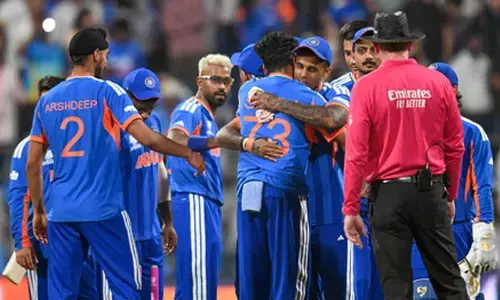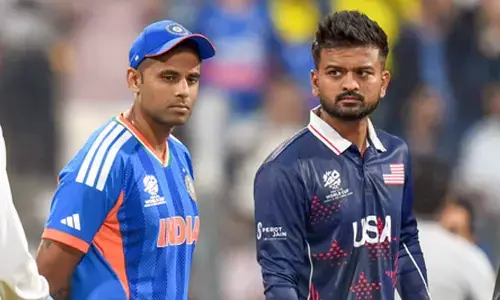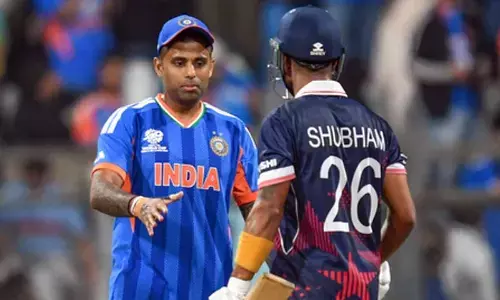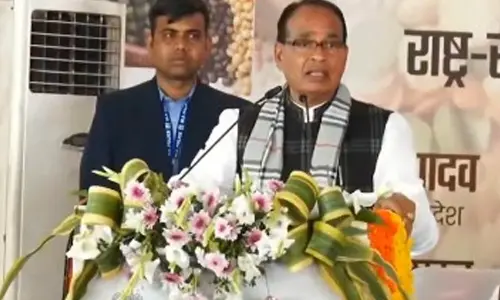Optimal level & balanced approach to reservations

Former Governor Kumud Ben Joshi of erstwhile Andhra Pradesh, whenever she differed with Chief Minister N T Ramarao, always defended herself saying, “I am Citizen First and Governor Next.”
Former Governor Kumud Ben Joshi of erstwhile Andhra Pradesh, whenever she differed with Chief Minister N T Ramarao, always defended herself saying, “I am Citizen First and Governor Next.” In 2001, National Human Rights Commission (NHRC) Chairman Justice J S Verma and Union External Affairs Minister Jaswant Singh differed on inclusion of ‘Treatment of Dalits in India’ in the UN ‘Conference Agenda’ on Racism.
During Emergency in a Habeas Corpus case, while four senior most Judges of Supreme Court, ruled in favor of ‘State's Right to Unrestricted Powers’ of detention, Justice H R Khanna in his dissenting opinion said that, “A dissent is an appeal to the brooding spirit of the law, to the intelligence of a future day, when a later decision may be possible to correct the error.” His decision did ‘Cost him Badly’ in denial of the coveted Chief Justice elevation. 24 years later, the Apex Court admitted that its ‘Emergency Time’ decision was “Erroneous and Violated Fundamental Rights.” Justice Khanna’s dissent is remembered forever for upholding fundamental Rights. That is the value and beauty of dissent!
A ‘Tweet’ by IAS officer Smita Sabharwal unpleasantly led to ‘Bulldozing Protests’ from a few individuals and organisations, including unviable challenges like demanding her to sit for UPSC examination again and beat her score. Equally, many supported Smita’s logic. In her view, IAS is a ‘Leadership Role’ requiring prompt response to law and order situations, be agile, be able to tour extensively, do field work, listen first hand to issues, and to be the ‘First Responder for Disaster Management.’ With due regard to all who fight against odds, Smita honestly feels that any form of visual, hearing, ‘Locomotive Disability’ may hamper these functions, like in jobs with specialised needs. It may be inconsequential whether Smita is absolutely or partially right or wrong, but should her freedom of expression, difference of opinion, and dissent, which is the philosophy behind Article 19 of Constitution and its Preamble – where a solemn resolve is made to secure to all its citizens, liberty of thought and expression – be denied ‘Lock Stock and Barrel’?
In India, reservations were necessitated to correct the oppression, inequality and discrimination inflicted on a few communities, when the earlier times Hindu society was divided into four Varnas, or Classes, that resulted in ‘Social, Economic, and Political Disadvantage’ to some, and leaving ‘Untouchables’ (Dalits), as they were called then, outside this system. During the independence movement, leaders like Nehru, Ambedkar, Gandhi etc., made efforts to help Dalits under the British Colonial Rule.
When in 1882 (William) Hunter Commission was appointed by Viceroy Lord Ripon, Jyoti Rao Phule and Hunter conceived the idea of ‘Caste-Based Reservation System.’ Later, the British Raj introduced ‘Elements of Reservation’ in the Government of India Act 1909. ‘Reservation System’ that exists today was introduced in 1933 through'Communal Award' by British Prime Minister Ramsay Macdonald, providing separate representation for Muslims, Sikhs, Indian Christians, Anglo-Indians and Europeans. The 'Poona Pact' signed between Gandhi and Ambedkar led to single Hindu electorate with reservations, wherein ‘Dalits’ having seats reserved within it. Representation of ‘Depressed Classes’ was intended then to be ‘Temporary.’
Reservation of Seats for Depressed Classes was incorporated into the Government of India Act 1935, and introducing the term ‘Scheduled Castes.’ With independence in sight, Ambedkar successfully expanded the scope of reservations from Legislative Seats to ‘Government Jobs and Education.’ Cabinet Mission Statement of May 1946 laid out a plan for the Constituent Assembly’s Composition, such that the body be a broad-based one. In addition to divisions for Muslims and Sikhs, it suggested ‘General Category’ which would include Hindus, Anglo-Indians, Parsis, Indian Christians, the Scheduled Castes (ST), Scheduled Tribes (ST), and women.
First Prime Minister Jawaharlal Nehru who sought to build a ‘Secular India’ designated Ambedkar as Law Minister, who became chairman of the ‘Drafting Committee’ for India’s Constitution. The draft included Muslims and Indian Christians among the beneficiaries of reservations in legislatures. In1950, the Constitution provided reservations in education and government jobs for SCs and STs, initially at 12.5% and 5% respectively, which now stand at 15% and 7.5% respectively, reflecting increase in population. Following Mandal Commission Report, in 1990, the VP Singh government provided 27% reservation for the Other Backward Classes (OBC).
10% reservation for ‘Economically Weaker Sections (EWS)’ in general category was introduced in 2019 through a Constitutional Amendment. The Persons with Disabilities (PWD) Act provided 3% reservations to ‘Differently Abled Persons’ in 1995 and increased it to 4% in 2016. Percentage of all these adds up to 59.5% vertical (SC, ST, OBC and EWS) and 4% Horizontal (PWD) which can overlap with SC, ST, OBC, and EWS categories. The grand total is 63.5%!!!
The Supreme Court which capped total reservations at 50% in 1992, to ensure that ‘Merit is not Compromised in Public Employment and Education,’ upheld in 2022 the decision of 10% reservation for EWS as an exception, taking total reservations beyond ceiling. Several states favored additional reservations, beyond ceiling, but the Supreme Court emphasized that any breach of ceiling must be based on extraordinary circumstances.
Recently, the Apex Court refused to pause Patna High Court's order scrapping 65% quota in Bihar. Reservations did play a significant role in ‘Promoting Social Justice and Equity.’ Nevertheless, either continuing reservations in the same fashion, or adopting‘Creamy Layer’ concept, to exclude more affluent and better-educated from availing reservations, is a complex issue and debatable intellectually, objectively, and dispassionately. It is essential to periodically review and assess the effectiveness and rationale of reservation policy, in its entirety, including data-driven socio-economic progress of beneficiaries. ‘Balancing Merit and Reservation’ is crucial for maintaining standards and competency. ‘Economic Criteria’ may perhaps better help many disadvantaged individuals to receive support irrespective of caste. Optimal level and balanced approach to reservations is appropriate with changing times.
Meanwhile, the Seven-Judge Supreme Court Constitution Bench, headed by CJI D Y Chandrachud, on August 1 held that the states have the right to sub-classify within the socially heterogeneous class, the SCs, based on their backwardness for benefits of reservation. Four of the Seven Judges viewed that the ‘Creamy Layer Principle’ be extended to the SC/ST category as in the case of OBC to exclude affluent availing benefits of reservation. “Reservation should be meant for only the first generation among a category and if the second generation has come up, then benefits of reservation shall not be given and State should see if after reservation the second generation has come shoulder to shoulder with the general category,” expressed one Judge.
Smita’s view that reservations for differently-abled persons in All India Services (IAS, IPS, IFoS) are not correct hints at that ‘Merit and Efficiency in Civil Services’ require high levels of competence and decision-making abilities. Ensuring that all candidates meet these criteria through ‘Merit-Based Selection Process’ might enhance the overall effectiveness of the Civil Service. Certain roles within Civil Services, especially in fieldwork or enforcement, may require physical abilities that some differently-abled individuals might find challenging, potentially impacting performance. Notwithstanding this, eligible differently-abled individuals capable of bringing unique perspectives and innovative solutions may be considered for ‘Role-Specific Assignments’ by providing ‘Targeted Training and Development’ ensuring that they are perfectly equipped for Civil Services. A ‘Nuanced Approach’ to reservations, thoughtfully based on nature of the job, might be more ideal.
Puja Khedkar’s ingenious misuse of PWD quota, which led to her debarment from future examinations, sparked a nationwide debate, exposing loopholes in PWD certification. It is time to seriously evaluate how well-meaning laws may be manipulated and backwardness turned to profit. Whether UPSC and Department of Personnel will further pursue and uncover all similar cases within the serving officers is a ‘Million Dollar Question.’
Nonetheless, questioning Smita’s ‘Inalienable Right and Freedom of Expression,’ as a citizen, is infringement of Article 19 of the Constitution. Smita also inadvertently initiated ‘National Debate’ on the ‘Whole Gamut of Reservations.’ The SC Judgment may be the beginning?
(Writer is a Senior Independent
Journalist and Analyst).















